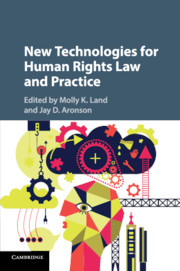New Technologies for Human Rights Law and Practice
New technological innovations offer significant opportunities to promote and protect human rights. At the same time, they also pose undeniable risks. In some areas, they may even be changing what we mean by human rights. The fact that new technologies are often privately controlled raises further questions about accountability and transparency and the role of human rights in regulating these actors. This volume – edited by Molly K. Land and Jay D. Aronson – provides an essential roadmap for understanding the relationship between technology and human rights law and practice. It offers cutting-edge analysis and practical strategies in contexts as diverse as autonomous lethal weapons, climate change technology, the Internet and social media, and water meters. This title is also available as Open Access.
Molly K. Land is Professor of Law and Human Rights at the University of Connecticut School of Law and Associate Director of the University of Connecticut’s Human Rights Institute. Her research focuses on the intersection of human rights, science, technology, and innovation.
Jay D. Aronson is the founder and director of the Center for Human Rights Science and Associate Professor of Science, Technology, and Society in the History Department at Carnegie Mellon University.

